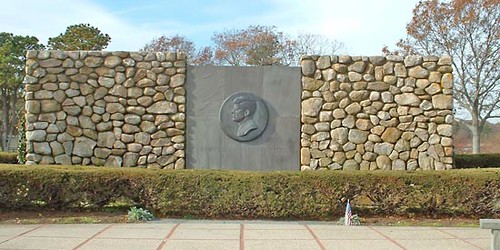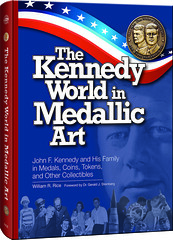
PREV ARTICLE
NEXT ARTICLE
FULL ISSUE
PREV FULL ISSUE
BOOK REVIEW: KENNEDY WORLD IN MEDALLIC ARTDick Johnson submitted this review of the new Whitman book on Kennedy medallic
art. Thanks! -Editor
Some might say Bill Rice has done for John F. Kennedy what Fred Reed has done for Abraham Lincoln in his two books on Lincoln collectables, all of which were published by Whitman. These are books to read and to savor. I hope this is a trend that continues in the future with other medal topics. Rice’s Kennedy book could thereby serve as a model for future medal authors. This book is not a catalog, although it has a 49-page listing of 2,837 Kennedy medals. The scope is that large. It continues the catalog numbering system established by Edward Rochette, who compiled and wrote the first book on medallic Kennediana in 1966. Because of its length the catalog listings are bare bones -- name, size, composition and a very brief comment. The one-medal one-line list contains all varieties known to the author. However, the author relates there may be another two to three hundred more Kennedy medals still to be uncovered. Collectors will undoubtedly demand a second edition with further data, such as who made the item, artist and producer and the notable events in its creation, all the medal lore of collector interest The author states he has a lot of this data already, it just wouldn’t fit in the first volume. Three features dominate this book, notably: the absolutely stunning photographs, the artistic layout, and the wide diversity of the associated items Bill Rice has gathered to supplement his medals. This includes news photographs and articles, drawings, letters, posters, jewelry items, advertisements, medal leaflets, statuettes, paperweights, cameos and cloth patches. All this in addition to badges, decorations, stamps, covers, post cards and paper money you might expect to find included. The high quality photographs are the work of the author, a 40-year professional photographer. He has gathered images from both institutions and private collectors – duly noted as Contributors – and his own collection, first started with a gift of a Kennedy medal from his father in 1963. Even with the such quality photographs, medals of varying medallic quality are shown. High quality pieces – created by top artists, as Paul Manship’s Inaugural medal, Ralph Menconi’s Presidential Medal, Gilroy Roberts' Presidential Series Mint Medal – are contrasted with medals hastily designed and crudely produced. Perhaps Kennedy would have liked the democratic cross section of his medallic art, allowing all to express their adulation of a U.S. president. Many of these later medals exhibit portraits of the 35th president in flat relief with an unrealistic likeness. However, all such medals should be included in a standard work – if they exist they should be included. To the author’s credit he has captured as many of the Kennedy medals which exist or caught up in his net. If, as the author expects, there still may be hundreds more, it does call for a second edition. When I met Bill Rice at the ANA Boston convention I mentioned to him I had a small version of the Agop Agapop architectural portrait of the president, shown as the frontispiece in Ed Rochette's 1966 book. The original was placed in situ on the wall of the Hyannis Massachusetts Kennedy Memorial, which the author has pictured on page 91.The six-foot relief of that wall portrait had been cast and the plaster original model returned to Medallic Art Company. I stumbled over that giant plaster for the four years I had to visit the storeroom. 
The section on challenge coins is impressive. Because these collectables did not exist when Rochette created his numbering system, Bill Rice had to create a new class of numbers,” KCC.” The Kennedy connection is with the USS John F. Kennedy Aircraft Carrier, which spawned many challenge medals. The 12-page section of these illustrates 92 items, many in enamel color with most produced by Northwest Territorial Mint, a sister firm of Medallic Art Company. At the end of a telephone interview the author extolled the art department at Whitman Publishing for their excellent artistic layout of the book. He stressed that praise several times. This writer echoes that sentiment. To read the earlier E-Sylum article, see:
Wayne Homren, Editor The Numismatic Bibliomania Society is a non-profit organization promoting numismatic literature. See our web site at coinbooks.org. To submit items for publication in The E-Sylum, write to the Editor at this address: whomren@gmail.com To subscribe go to: https://my.binhost.com/lists/listinfo/esylum All Rights Reserved. NBS Home Page Contact the NBS webmaster 
|

